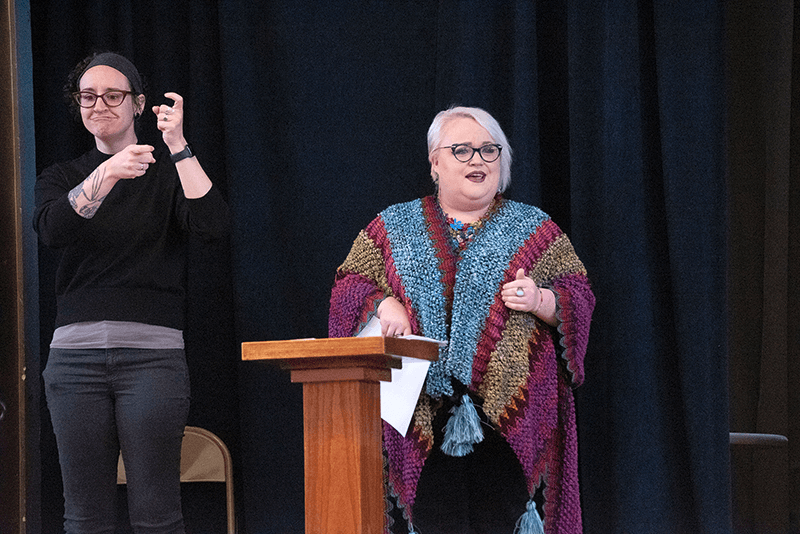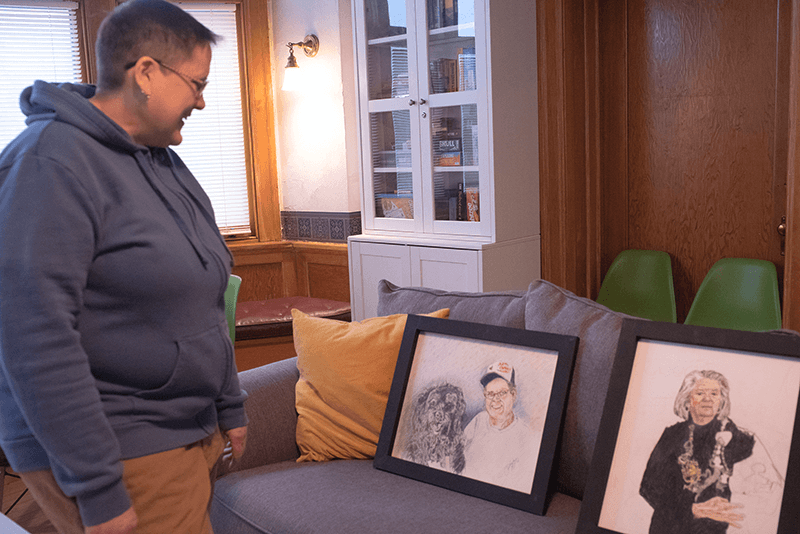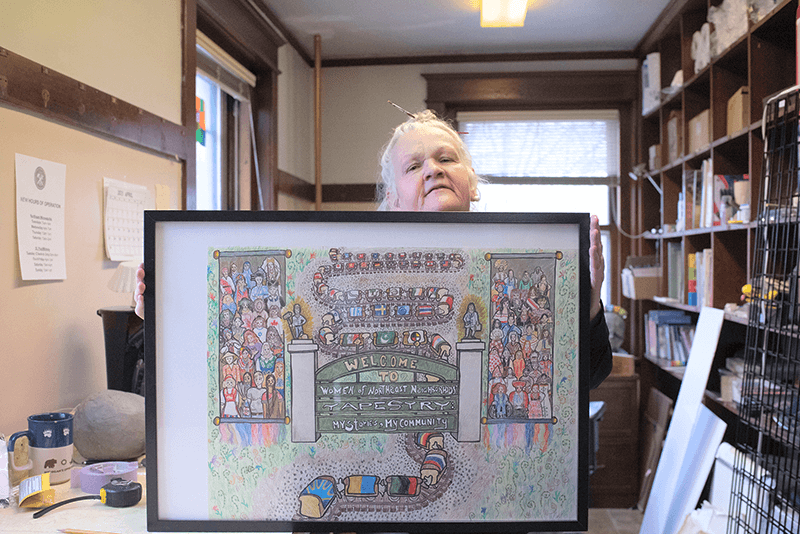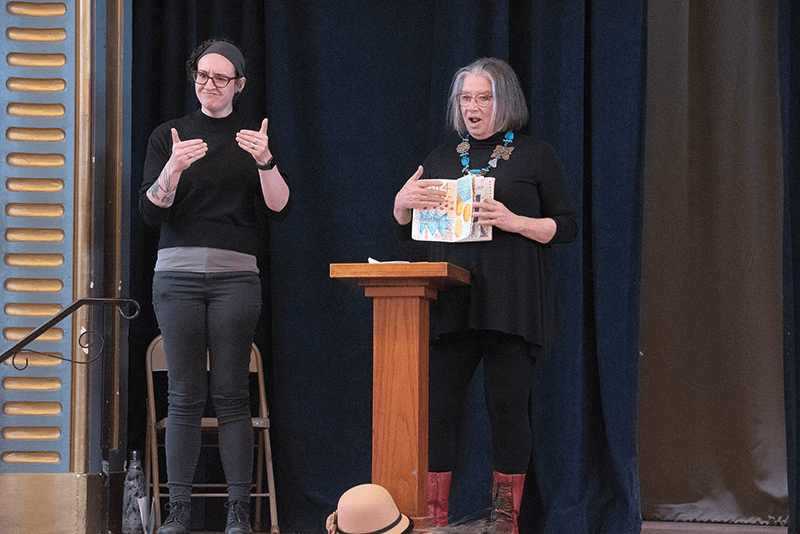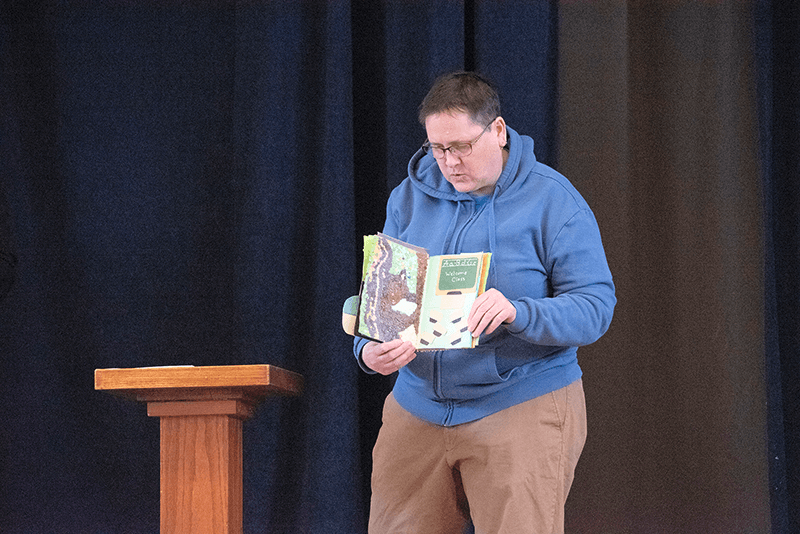During the height of COVID, Northeast artist Ellie Kidder was feeling disconnected and isolated. Then one day during the pandemic, while watching legislators on TV, she saw how many were men and noted the absence of women’s points of view. “At that second, I realized we don’t know how to take advantage of our voices,” Kidder said. That realization, and her desire for connection, led to the project “Northeast Women as Changemakers,” which culminated in an afternoon of six Northeast women, including Kidder, telling their stories on the afternoon of April 22.
The event was held in Charles Thompson Memorial Hall in St. Paul, a historic building that has served as a social club for the deaf community in the Twin Cities. Kidder, who is deaf, has her studio in the building. Sign language interpreters were provided.
Kidder applied for and received a Minnesota Arts Board grant for the project, then put out a call for people to nominate women who have stories to tell and are advocates in some way for their Northeast Minneapolis neighborhood. “It does not need to be deeply personal, but it is my hope that during the show some women will find a source of inspiration and hope from your story,” the call read. It gave some examples of the types of impact the women might have on the community, and the last bullet point was “It can be anything and hopefully a tie with your life challenge.”
All of the five project participants who spoke at the April event talked about their life challenges and how they have lived through them. Some talked about tragedy, trauma and PTSD; others talked about living with their queer or transgender identity. All spoke about how they have learned to survive and thrive.
Barbara Bridges, founder and director of the 5-year-old nonprofit Art to Change the World, said that the first 50 years of her life was spent battling and trying to manage other people’s violence and addictions. It was only in the last decade that she really got control of her life.
“My story would make you weep, but in order to tell it, I would have to tell you other people’s stories. And most importantly, I would have to live it again. I do not generally share these details because I choose to focus on the positive,” Bridges said. She said that now, “life is good,” and that she works hard on making that “a continuing reality.” Art to Change the World (ACW) now has 400 paying members, and has paid artists more than $100,000 over the past few years, she said. “ACW provides me with what all humans need: purpose. I would encourage you to create your own happiness … Live your best life. You are in charge of that outcome.”
Bridges was followed by Catherine Palmer, who goes by Katie, an artist who is also on the ACW task force. She showed the audience her visual journal, which was made as part of the project, and reflected on aspects of her childhood as the youngest of 15 children, and as a child with learning disabilities.
People were always saying “You can’t do it right,” Palmer said, and she turned to art in response to that. “I was always, like, using art as a way to say ‘I can do whatever I want.” She came out in the ’90s, became a queer activist, and through that found a loving and supportive community, she said. Palmer worked for District 202, which served gay, lesbian, bisexual and transgender youth. Now she’s an inclusivity coordinator for the Show gallery in St. Paul and strives to provide experiences, like intuitive art classes, and spin art, for people to try making art. She’s committed to “doing different kinds of fun things that people could do to step into art,” she said.
Emily McGrath also talked about coming out as a queer woman. For her, it was 13 years ago, in a small rural Minnesota town. The experience was daunting, she said, but she also said that she often jokes that her family knew her identity before she did. Overall, her coming out was positive.
“I actualy danced to the song in my own heart, and I was welcomed pretty much with open arms,” McGrath said. Knowing that isn’t the case for many queer individuals, she wanted to pass forward the love and belonging she had experienced. “I knew that I wanted to use the privilege that I had to help others find their purpose and help others know that they matter and that they belong.”
She found that opportunity when, nine years ago at Twin Cities Pride, she came across a bunch of folks dressed in white clown faces and nun habits. They were the Sisters of Perpetual Indulgence, an organization of queer and trans “nuns” with chapters across the world, devoted to community service and outreach. As Sister Kim Boocha, with “gallons of clown white makeup” and glitter, McGrath said she has raised money for charitable causes and attended rallies to stand up for others. Through that persona she has been able to find herself and show others that it’s okay to be themselves, as well as do a lot of self-reflection, she said.
The next speaker, Julia, told of struggle and perseverance through sexual assault, domestic violence, PTSD and anxiety, a marriage and divorce, and her son being born prematurely with a congenital heart defect that needed surgery. On top of that, after suffering debilitating pain, she was diagnosed with Ehlers-Danlos Syndrome (EDS), a connective tissue disorder. Julia’s career as a paralegal was interrupted several times with leaves of absence to treat her mental health. “What I’ve learned in my life is that I cannot control other people’s behavior, only what I will and will not do in response to it. I’ve become an incredible support and advocate for myself. The thing is, I’ve learned that I can go on for pretty much anything.”
She now holds a position working with an animal-focused nonprofit, and last February she began taking pole dancing classes at Phoenix Flight Pole and Aerial, where she found community “in people of all genders, all bodies, all walks of life,” and also workouts that emphasize bodyweight strength and stability, which are key to living with EDS.
The last participant to speak was Nadia, a writer. She came to the Twin Cities seeking recovery, and has found much more. “Everything from the smile on my face to the style of my hair has been gifted to me,” she said. “The city and its queer and female residents have soaked into my soul through osmosis. The city has truly transformed me even in a literal physical sense. She found “world-class transgender health care,” something that she did not have access to where she had lived in Indiana. She spoke of first encountering the idea of Pride at a gathering of with transgender people of all ages in Muncie, Ind., in 2016. “I was used to transgender stories of just pain and exclusion,” she said. There, for the first time, she met transgender women living lives that she wanted to live.
Nadia told of the hostility she faced from customers as she worked at a Dollar General Store in her hometown. “At the time, I felt so ashamed of myself. I felt ashamed of my face, of my body, my entire presence. I could barely stand to show my face every shift. I contemplated suicide. I persisted. I came to work every day. And gave my best effort. I became a store manager of my own store and the company that I really cared about. Maybe working in a retail store isn’t like a huge accomplishment for many people. But for transgender people, sometimes everyday things that are easy for other people can take a Herculean amount of effort for a trans person,” she said. In the current climate where anti-LGBTQ laws are being passed and transgender care is under attack, she encouraged the audience to uplift the transgender people around them.
Ellie Kidder told her story last, using sign language. She talked about her experiences as a deaf person being prevented from using sign language at her “oral” school in high school, and her recently-diagnosed complex PTSD that arose from her earlier experiences. She realized it is the reason she has had trouble connecting with people. “I used this project really hoping to connect with women in Northeast Minneapolis,” she said. “This project really has become a healing thing for me.”
As part of the project, the women, including six participants who were not part of the event, met on Zoom for several months, sharing with each other their stories, and creating and sharing art journals. Kidder also incorporated her art, painting portraits of each of the participants. At the event she shared a large color-pencil drawing that featured the design of the “Welcome to Northeast” sign at Broadway and Central, but instead reading “Welcome to the Women of Northeast Neighborhoods – Tapestry: My Stories, My Community.” More than 50 women from different cultures are shown in columns on either side of the sign, and zigzagging between them is a train, the cars coupled by grasping hands. The cars are depicted as bread loaves that are draped with flags of different countries and identities. There’s a rainbow flag, and the first car shows the Signal Union flag, a symbol of the deaf community.
Kidder ended the afternoon thanking the participants for their open sharing. “I want to empower women. I want them to take the stage. I want you to have the floor and say exactly what you want to, not in subtle terms. Put it out there. Come to this podium and put one seed here. That’s how a tree grows. It begins with a very tiny little seed, and you’ll see, we will grow.”
Emily McGrath talked about her work with the Sisters of Perpetual Indulgence, a queer and trans organization devoted to community service. Artist Catherine Palmer viewed the portrait that Ellie Kidder drew of her. Ellie Kidder, in her studio in Charles Thompson Memorial Hall, shared her color pencil drawing depicting the women of Northeast Minneapolis. Art to Change the World founder Barbara Bridges and artist Catherine Palmer shared the visual journals they created as part of Ellie Kidder’s Northeast Women as Changemakers project. (Photos by Karen Kraco)
